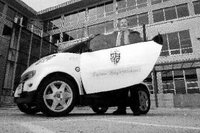Projects looking at plants, vegetables for manufacturing
If a “biocar” project comes to fruition, your car could include parts made from soybeans, top, and canola oil.
You’ve heard about driving with vegetable fuel, but how about driving in a vegetable?
If the new “biocar” project goes smoothly, in less than four years you could be sliding into your new car seat made out of canola oil, checking the speedometer on a dashboard made out of wheat and pulling shut the door manufactured, in part, from soybeans.
“We’d like to replace the plastic in cars with plastic made from plants and reusable material. The idea is to reduce the waste,” said Larry Erickson, associate professor of plant agriculture at the University of Guelph, one of 24 researchers on the project.
“You may not even notice it. Before you know it, you’ll be sitting on seats made from soy or canola oil, parts of your dashboard have a nice wood look to them because they’ve incorporated wheat-straw in with plastic,” he said yesterday, after the Ontario government announced a $6-million boost to the project.
Besides giving a stranded driver something to nibble on, potential environmental benefits are enormous: The plants would replace petrochemicals currently used to make plastic. The resulting parts would also weigh less, making the vehicles more fuel-efficient, explained University of Toronto forestry and chemical engineering professor Mohini Sain, project leader.
Bioplastics are, on average, 10 per cent lighter than conventional plastics. And every kilogram skimmed from a one-tonne vehicle saves seven to nine litres of fuel each year, he said. Multiply that by the seven million light-duty registered vehicles that crammed the roads across the province in 2005, and “you are looking at 50,000 barrels of oil,” said Sain.
The project is in its infancy. But over the next four years, researchers from the universities of Toronto, Guelph, Waterloo and Windsor will look at crops on a molecular level for their ability to make a durable plastic.
The fatty acids from vegetable, soy or canola oil, for instance, can be converted into polyethylene foam used in car seats. Using a bacteria, corn starch can be made into a biodegradable plastic for instrument panels and doors. The fibre from corn stalks can be used as a reinforcement agent, like fibreglass.
The news comes as relief to both farmers and the auto sector, which has contributed $6 million to the project, Sain said.
“Ontario is losing competitiveness in the automotive and forestry sectors and agriculture is struggling. They need some S.O.S,” said Sain. “This one idea can bring all three together.”
Environmentalists are holding their applause. If the energy required to grow the crops is more than the amount saved — often a criticism of biofuel made from corn — then there is no benefit, said Mark Winfield of the Pembina Institute.
Source: Torstar News Service


